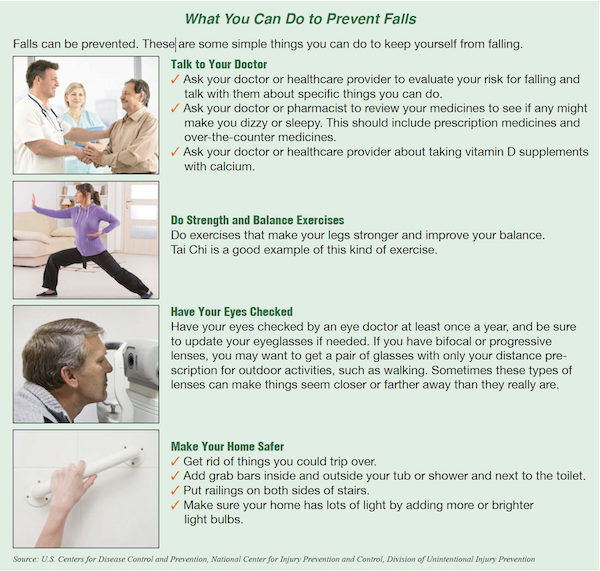Are You at Risk for Falls?
For most cancer survivors, the answer is yes.
by Cassandra Vonnes, MS, ARNP, GNP-BC
It can happen in a blink of an eye – an accident, a misstep, lightheadedness when standing too quickly. According to the U.S. Centers for Disease Control and Prevention, unintentional falls are the leading cause of injury and death in Americans over the age of 65. Typically, fall risks are highest for the elderly. However, people with cancer, regardless of age, are also at high risk for falls because of the disease and its complicated treatments.

How Cancer Increases Your Risk of Falls
It is estimated that 20 percent of people 65 years old or older with newly diagnosed cancer will experience a fall at home within the first six months after their diagnosis. There are several factors related to cancer and cancer treatments that increase the risk of falling.
Medications The medications cancer survivors often take for nausea, anxiety, or pain can act on the central nervous system and affect balance, coordination, and blood pressure. These drugs can cause feelings of faintness or unsteadiness, drowsiness, and confusion. They can also cause you to forget your limitations. It is important to know the possible side effects of the medications you are taking so you can tell your doctor or nurse how the drugs make you feel.
Loss of Strength Extended bedrest and a decrease in physical activity often occur during cancer treatment. This can lead to a loss of muscle strength and leg weakness, which can increase your risk of falling. Regular activity (even just sitting in a chair) can help you maintain your strength and prevent a fall.
Low Blood Counts Chemotherapy can cause anemia, or a drop in your hemoglobin. Hemoglobin is the substance in your red blood cells that carries oxygen to your tissues. Without enough oxygen, you can feel tired, weak, short of breath, or lightheaded. This can make regular activities more difficult. Anemia can also cause low blood pressure, which is linked to an increase risk of falls.
Dehydration Treatment-related diarrhea and vomiting, or not drinking enough fluids, can lead to dehydration. Dehydration is common during cancer treatment and can increase your risk of falling. When you are dehydrated, your blood pressure may drop when standing. This is called postural or orthostatic hypotension (low blood pressure). If your blood pressure is low and you go from a sitting to a standing position too quickly, you may faint or pass out. If you feel dizzy or lightheaded, sit or lie down in bed and notify your medical team. To prevent dehydration, keep track of the fluids you drink to make sure you are getting enough to stay hydrated. If you are experiencing diarrhea or vomiting, make sure to take in extra fluids to replace those which are lost.
Electrolyte Imbalances Imbalances in electrolytes, such as sodium, potassium, magnesium, and calcium, are also common in people being treated for cancer. Electrolyte levels that are too high or too low can cause an irregular heartbeat or changes in the central nervous system that can cause you to faint. An electrolyte imbalance can also cause your central nervous system to become uncoordinated. Regular blood tests can tell your doctor if there is a problem with your electrolyte levels, and electrolytes can be replaced with an IV infusion or pills if needed.
Neuropathy Certain types of chemotherapy and other drugs used to treat cancer can damage the nerves in your hands and feet. This is called chemotherapy-induced peripheral neuropathy. These peripheral nerves carry sensations or feelings from the hands and feet to the brain. When they become damaged by cancer treatment, you may experience pain, burning, tingling, numbness, and loss of feelings in the hands and feet. Peripheral neuropathy can affect your ability to walk and could lead to a serious fall. Talk to your doctor or nurse if you are experiencing symptoms of peripheral neuropathy because you may need a change in your treatment plan in order to prevent these symptoms and lower your risk of falling.
20% of people 65 years or older with newly diagnosed cancer will experience a fall at home within the first six months after their diagnosis.
Why Cancer Survivors May Have a Higher Risk of Injury during Falls
In addition to an increased risk of falls, people with cancer may also have a higher risk of injury if a fall does occur. Chemotherapy can cause a drop in your platelet count. Platelets control bleeding by helping your blood to clot; therefore, people with low platelets may bleed more easily after a fall. A fall in a person with a low platelet count could be serious if a head injury occurs.
In addition, osteoporosis (or thinning of the bone) can occur with some cancer treatments, steroid medications, and menopause. A person with osteoporosis is more likely to experience bone fracture or breakage during a fall, as their bones are thinner and weaker. Likewise, if cancer has spread to the bone, the bone is weaker and can break more easily during a fall.
Cancer and cancer treatments are life-changing events. Do not let a fall be one also. Hip fractures from falls are a leading cause of disability, and they could slow your cancer treatment process. Take time to understand your risk for falls and ask your doctor about steps you can take to prevent them.

Cassandra Vonnes, a gerontological advanced registered nurse practitioner, is the coordinator of NICHE (Nurses Improving Care of Health-System Elders) at Moffitt Cancer Center in Tampa, FL.
This article was published in Coping® with Cancer magazine, November/December 2015.


